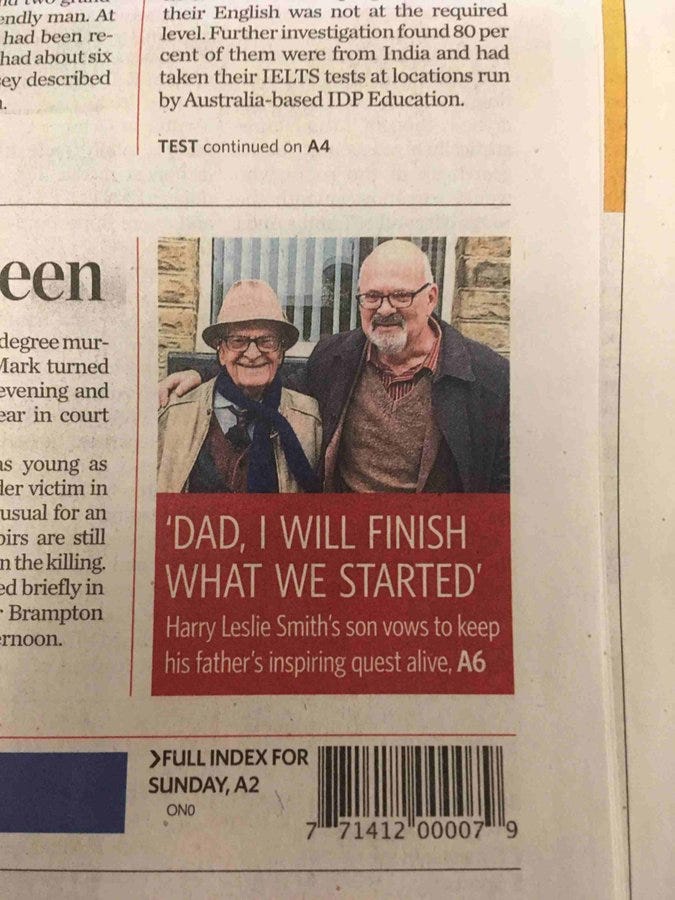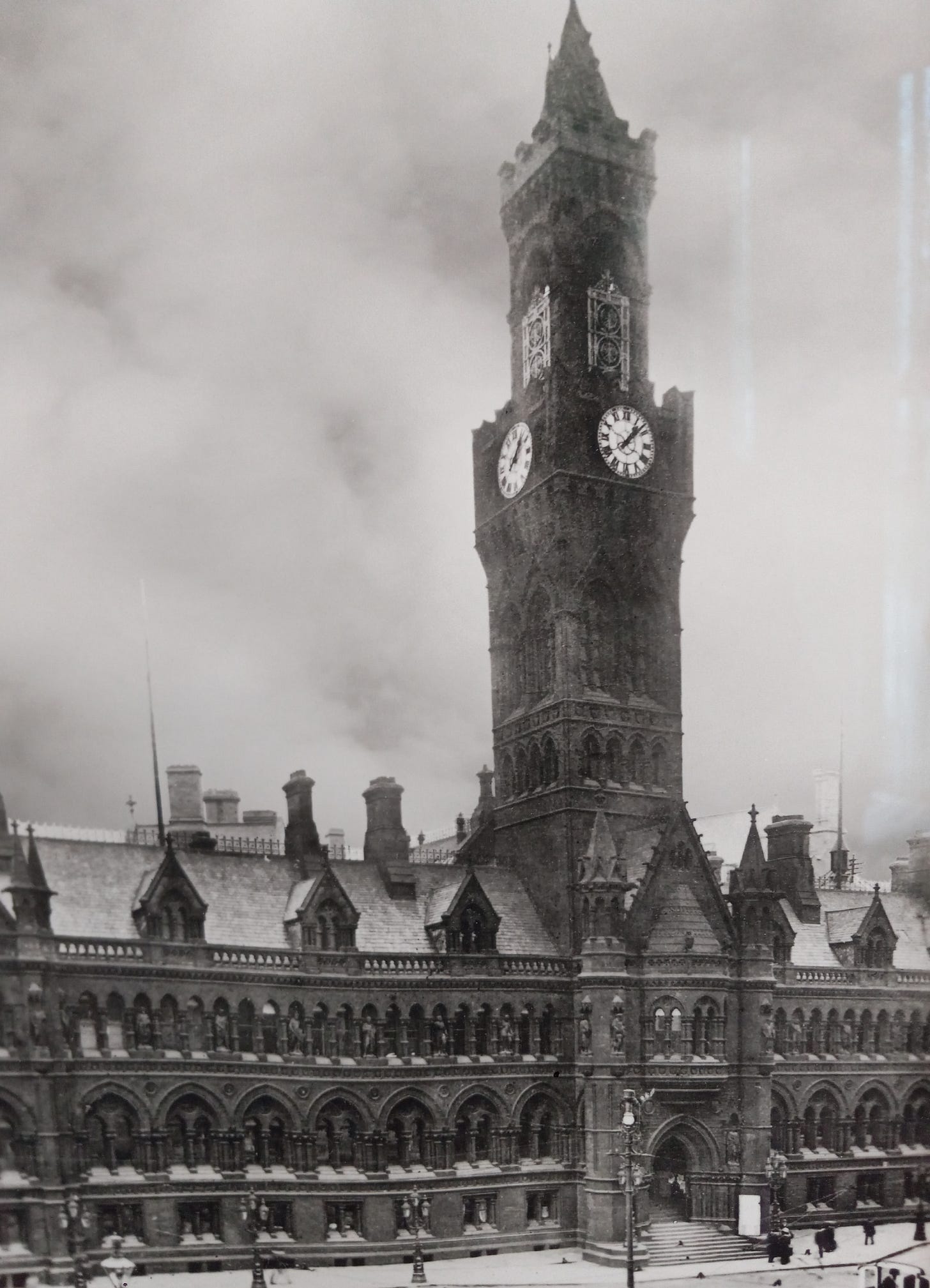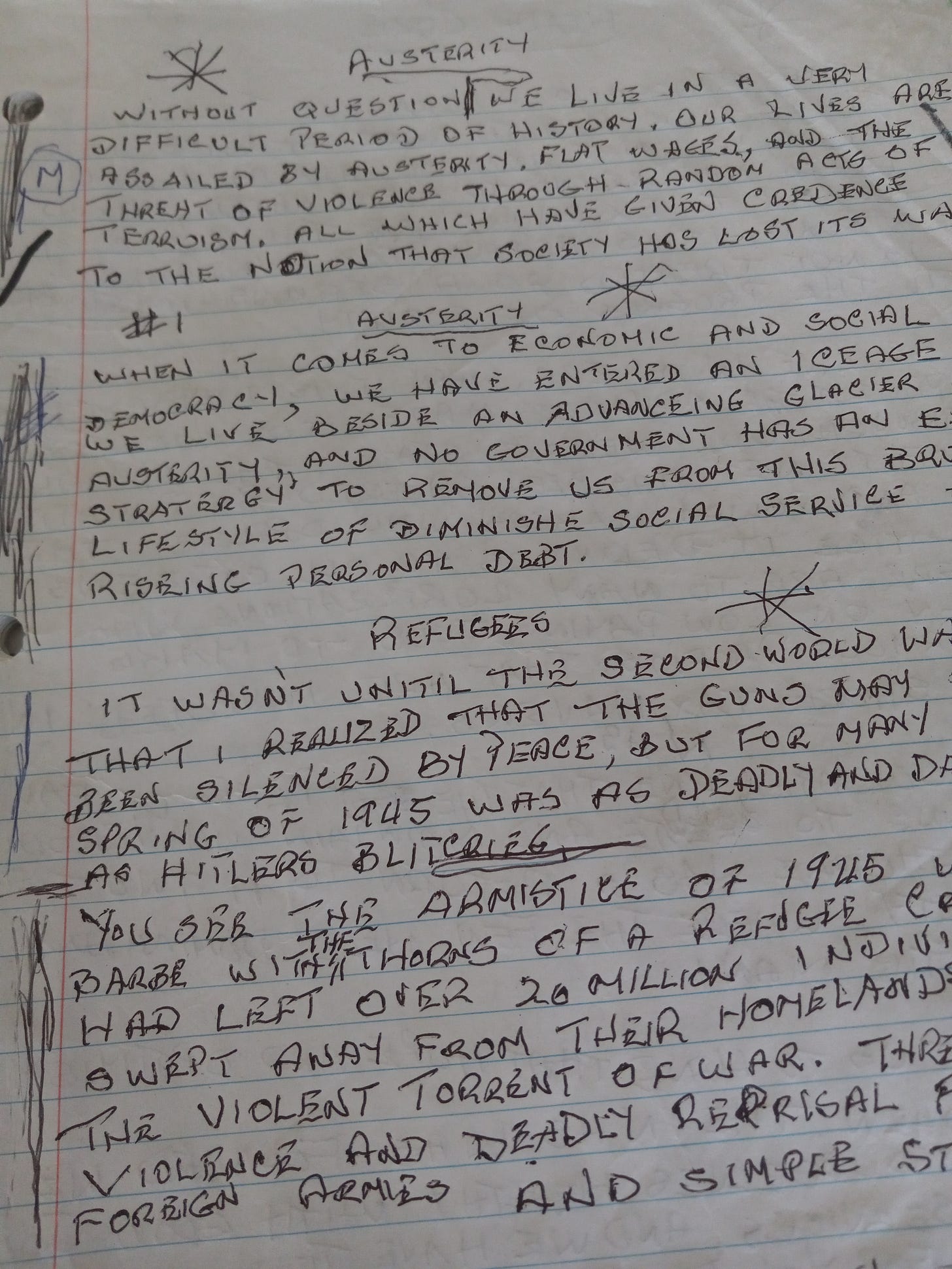The cost of living crisis in 2023 is creating a lost generation just like it did in the 1930s.
Harry Leslie Smith
February 25, 1923-November 28, 2018
The 1930s should be ancient history. But after decades of neoliberalism, years of austerity, and an end to living wages for most workers. The Great Depression years feel like an analogue version of today. Fascism is as threatening in 2023 as it was in 1933, and like that era, it is a dominant political force. This time, I don't think we will win against it because our political class has disengaged itself outside of lip service with- the real economic and social struggles of its ordinary citizens.
It's one of the reasons I have attempted over these last years to promote my father's working-class history on social media.
Harry Leslie Smith was an ordinary man who lived through extraordinary times. His life's journey was the odyssey that most of his working-class generation endured: poverty, war and then renewal with the creation of the Welfare State.
Before my father's death 5 books were published. However, The Green and Pleasant Land was unfinished at the time of his death. I've been piecing it together from all the written notes, typescript & index cards my father left behind. Below is Chapter 6 from the work.
It is free to read as is much of this sub stack. But if you are able and only able to, a paid subscription is most appreciated and 3.50 per month or 50 per year. These subscriptions allow me to finish the job I started with my dad in 2010 when the Harry's Last Stand project began. They also keep me housed. Getting a rather bad bout of cancer at the start of the pandemic, along with a diagnosis of lung disease, altered both the trajectory of my life and the prospects available to me.
Chapter Six:
Over eighty years on, but I still remember 1930 as if I'd bumped into on the street yesterday. You never forget hunger or how people will betray one another for a morsel of food. 1930 was a year of famine for me, my family and working-class Britain. Hunger gnawed at the bonds that held our family together until they tore apart from a desire for self-preservation. My parent's marriage was irreparably sundered in 1930- love cannot be nourished on an empty belly.
My childhood, such as it was, concluded that year as I learned my mother did not have the emotional strength to protect me from- the harsh world- we inhabited.
During an era of economic collapse, nothing lasts, not love, loyalty, or friendship. Kindness was like ballast dropped from a faltering balloon in danger of crashing to the ground.
My mother didn’t set out to abandon my father, but The Great Depression robbed her of the ability to act nobly. By the time we came to living doss house rough, Mum knew our Dad was a dead weight that would drown us all if he was not jettisoned from our lives. In that era, my mother's only hope and mine to escape death by poverty was for her to find a man capable of earning his scratch. The problem was Mum was as bad at picking men as my uncle was at picking winning horses.
My mother crashed into the orbit of a handsome, quick-talking Irish navvy named O’Sullivan when he arrived as a lodger at our doss house. This navvy liked her too, or at least the prospect of wooing my Mum into bed. He lavished her with compliments, jokes, and flirtation.
O'Sullivan carried himself like a soldier and was sure of himself. The economic crash hadn’t stolen his sense of self-worth. Confidence was- an aphrodisiac for Mum, who had lost hers after too many midnight flits.
O’Sullivan made Mum smile and laugh, and despite my early age, I knew she liked him more than she should. Sometimes, she didn’t come back to sleep in our room at night, and there were whispers from other lodgers about the sin of fornication.
For Mum, O’Sullivan’s attentions were like a life preserver thrown to a drowning person. She reciprocated his affections and longed to be with him. She resented the time spent in my father's company and became more acerbic and cruel to him.
Nightly under the spluttering glow of our one gas light that was bolted onto a greasy wall, my Mum cursed my Dad for leading her into a life of harsh poverty. Dad did not fight back but instead apologised for his age, infirmities and the things that were not his fault. Mum was never sated by his acceptance of guilt because Dad saying sorry was not enough for her. Mum resented my father because she was the one who begged, borrowed, and stole to ensure that my sister and I had some morsel of food for our tea each night. Mum was the one who went to charity shops and pleaded for clothing for me and Alberta.
Mum was the one who obtained for me the worn corduroy trousers that were stained with the piss from its former owner at the St Vincent De Paul mission.
“I am the one who eats the shit for thee,” was Mum's response if anyone dared to question any of her decisions that affected our entire family.
Mum fell in love with O'Sullivan because it was an escape from the reality of her existence. It was a fantasy more than anything else. Yet, it had horrible consequences for everyone but O’Sullivan. My mother deluded herself into believing a new life could be at hand for her and her kids with this attractive young workman who promised her a life of plenty down south. She ignored the reality she was already married to my father, who, although disabled, was very much alive.
In the 1930s, working-class women rarely obtained a divorce because of the cost and the moral hypocrisy of that era. Facts, however, didn’t stop my mum, and she did all that she could to make herself become more than a fling to O’Sullivan.
Although she went about it most peculiarly because her Irish lover didn’t seem to my childish eyes to be a man of any faith, save for that of self-preservation and taking, damn the consequences, what he could from others.
It got into Mum’s head that if her children were the religion of her lover, it might be easier to pass us all off as a family unit. My mother was plotting ahead and reasoned that my dad could be abandoned- while she, Alberta and I would live with O’Sullivan outside of Yorkshire as a pretend family. To aid in this fiction, my mother had me and my sister converted to Catholicism whilst she a sinner, stayed far away from any confessional.
Yet it was not just lust that drove my mum to embrace the Church of Rome. Mum had heard that the catholic church in Bradford provided better food parcels than the Church of England.
I remember my first day at that catholic school and being terrified by the priests whose faces were whisky-red from too many nights of cards and cigarettes. I soon learned it was not the priests you should fear but the nuns who taught me my catechism.
Sister Christine was the nun I learned to fear more than anything else because she seemed charged by God himself to deliver his wrath against me. Sister Christine was a dour, unhappy character who took no joy in beauty or in children.
One day at school, the Sister instructed our class to draw an apple that sat on a table. Like a creeping Jesus, the Sister moved around the room on rubber-soled shoes to inspect the drawing prowess of each student as if she were a judge at an art competition. When Sister Christine came and inspected my drawing of the apple, she was not pleased. The nun said with disgust. It was sloppy, smudged an insult to her and God. Not satisfied with verbal barbs, the Sister so outraged by my drawing, struck me with a strap across my forehead. The strength and ferocity of the blow made me black out for a moment. When I came to, I wept in pain, fear, and humiliation.
When I returned home from school, my mother noticed the bruised whelp on my forehead. It outraged her that a stranger dared to physically punish a child of hers. Mum would have her retribution and went to school with me the following morning to confront Sister Christine about my beating.
“I hear you’ve been disciplining our Harry for not meeting your fancy apple approval.” Sister Christine obfuscated and claimed I had been acting out in class.
“Sister, mark my words, touch my boy again; I will beat you black and blue with my very hands.”
Upon leaving, my mother said to the nun, whose mouth was agape in surprise and fear, “Justice is mine sayeth the lord.”
*********
As my birthday gift, Dad found a few spare pennies- and took me to the Alhambra Theatre to watch a pantomime of Humpty Dumpty. He could only afford the cheapest seats, which were high up in the theatre.
While we climbed to them, he said, "Mind you don't bump your head on a nearby cloud." But I didn't care. I had never been to the theatre, and I was just thrilled to be in the company of my father. When the performance was over, I felt I'd been touched by magic. However, that feeling of exaltation didn't last long.
My joy from that afternoon matinee was quickly dissipated by witnessing my parent's marriage founder on the sharp rocks of poverty, infidelity, and mutual recriminations.
My mother's affair with Mr O'Sullivan caused extreme discord within our family. There were arguments, yelling, and hurtful things said to each other, but never any physical violence. Mum was desperate for love, for an escape from our poverty. She blamed my father for our circumstances and berated him in front of me.
After my birthday, something snapped in Mum, and she concluded enough was enough for her. She deluded herself into believing that O'Sullivan could save her and her children from the Dickensian poverty we lived in and ran away with him to start a new life. Mum believed all things in her life could be fixed if she ran off with O'Sullivan.
My mum fled south with O'Sullivan because he had friends and work available to him in St Albans. They left by train to an England she had never seen before. Mum never read the book. But maybe when the movie version of Anna Karenina came out in 1935, she watched it at the cinema and recalled her desperate escape from Bradford in March of 1930. She might have recognised her own experience of attempting to flee destiny in a third-class carriage that trundled its way to London, she, like Anna, had chosen the wrong man to live in exile with.
My family waited through the early spring for news of my mother, but none came. During that time, my dad, my sister, and I survived on handouts, begging and sometimes the pity of my mum's relations who came over to our doss house and paid the arrears on our rent or provided leftover food from their table.
Dad tried to be strong for his children, but what happened to him and us in the year 1930 beat him like a vicious drunk beat their disobedient dog. My father emotionally retreated from his children and the reality of our destitution. On occasion, I found him staring at the grimy walls of the room we lived in, with tears rolling down his face. However, most days, he escaped the world by taking long walks around the city of Bradford or by reading from his eight-volume encyclopaedia of the ancient world. In 1930, I was seven and alone outside of my ten-year-old sister's protection in the harsh environs of Great Depression Bradford.
This month marks the 5th anniversary of my dad's death. It also marks the second anniversary of my Harry's Last Stand newsletter going live. During these past 24 months, I have posted 245 essays, as well as excerpts from the unpublished works of Harry Leslie Smith - along with chapter samples from my book about him. My newsletter has grown from a handful of subscribers to 1200 in that period. Around 10% of you are paid members. I appreciate all of you but ask if you can switch to a paid subscription because your help is NEEDED to keep me housed and Harry Leslie Smith's legacy relevant. But if you can't all is good too because we are sharing the same boat. Take care, John.






Thank you John for passing along another tale well told by Harry. Surely you lived a charmed life with your father and his outlook on the world. What a wise man. I can see how you loved him so much.